There are hundreds of books out there on writing. With so many choices, it can be difficult to narrow it down to the one that fits your writing project, process, and approach. Compiled from the recommendations of Write for You podcast guests and trusted OWRC graduate colleagues from past and present, the Graduate Writer’s Reading List is a short collection of books with a wide range of approaches. Whether you are interested in practice or process, texts that are short or long, this collection aims to help you find the book you need without hours of scrolling.
Searching for a quick read to fit a packed schedule? Look for the asterisks next to each book title for a rough guide on length:
* books 200 pages or less
** books 200-350 pages
*** books 350+ pages

What I Talk About When I Talk About Running by Haruki Murakami (Vintage International, 2009) *
Recommended by Lily Shapiro in Write for You, Season 2, Episode 2
Available from the UW Libraries in print.
From the publisher:
An intimate look at writing, running, and the incredible way they intersect, What I Talk About When I Talk About Running is an illuminating glimpse into the solitary passions of one of our greatest artists.
While training for the New York City Marathon, Haruki Murakami decided to keep a journal of his progress. The result is a memoir about his intertwined obsessions with running and writing, full of vivid recollections and insights, including the eureka moment when he decided to become a writer. By turns funny and sobering, playful and philosophical, here is a rich and revelatory work that elevates the human need for motion to an art form.
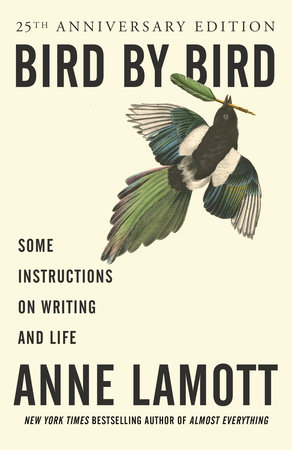
Bird by Bird: Some Instructions on Writing and Life by Anne Lamott (Anchor, 1995) **
Recommendation taken from several guests in Write for You, Season 3, Episode 2 and Episode 3.
Available from the UW Libraries in both eBook and print formats.
From the publisher (excerpted):
For a quarter century, more than a million readers—scribes and scribblers of all ages and abilities—have been inspired by Anne Lamott’s hilarious, big-hearted, homespun advice. Advice that begins with the simple words of wisdom passed down from Anne’s father—also a writer—in the iconic passage that gives the book its title:
“Thirty years ago my older brother, who was ten years old at the time, was trying to get a report on birds written that he’d had three months to write. It was due the next day. We were out at our family cabin in Bolinas, and he was at the kitchen table close to tears, surrounded by binder paper and pencils and unopened books on birds, immobilized by the hugeness of the task ahead. Then my father sat down beside him, put his arm around my brother’s shoulder, and said, ‘Bird by bird, buddy. Just take it bird by bird.’”
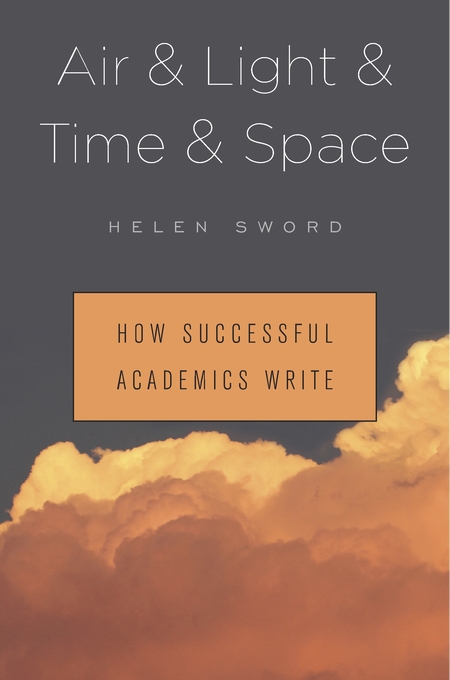
Air & Light & Time & Space by Helen Sword (Harvard University Press, 2017) **
Recommended by Caitlin Palo in “Recommended Reading: Helen Sword’s Air & Light & Time & Space.”
Available from the UW Libraries in both eBook and print formats.
From the publisher:
From the author of Stylish Academic Writing comes an essential new guide for writers aspiring to become more productive and take greater pleasure in their craft. Helen Sword interviewed one hundred academics worldwide about their writing background and practices. Relatively few were trained as writers, she found, and yet all have developed strategies to thrive in their publish-or-perish environment.
So how do these successful academics write, and where do they find the “air and light and time and space,” in the words of poet Charles Bukowski, to get their writing done? What are their formative experiences, their daily routines, their habits of mind? How do they summon up the courage to take intellectual risks and the resilience to deal with rejection?
Sword identifies four cornerstones that anchor any successful writing practice: Behavioral habits of discipline and persistence; Artisanal habits of craftsmanship and care; Social habits of collegiality and collaboration; and Emotional habits of positivity and pleasure. Building on this “BASE,” she illuminates the emotional complexity of the writing process and exposes the lack of writing support typically available to early-career academics. She also lays to rest the myth that academics must produce safe, conventional prose or risk professional failure. The successful writers profiled here tell stories of intellectual passions indulged, disciplinary conventions subverted, and risk-taking rewarded. Grounded in empirical research and focused on sustainable change, Air & Light & Time & Space offers a customizable blueprint for refreshing personal habits and creating a collegial environment where all writers can flourish.
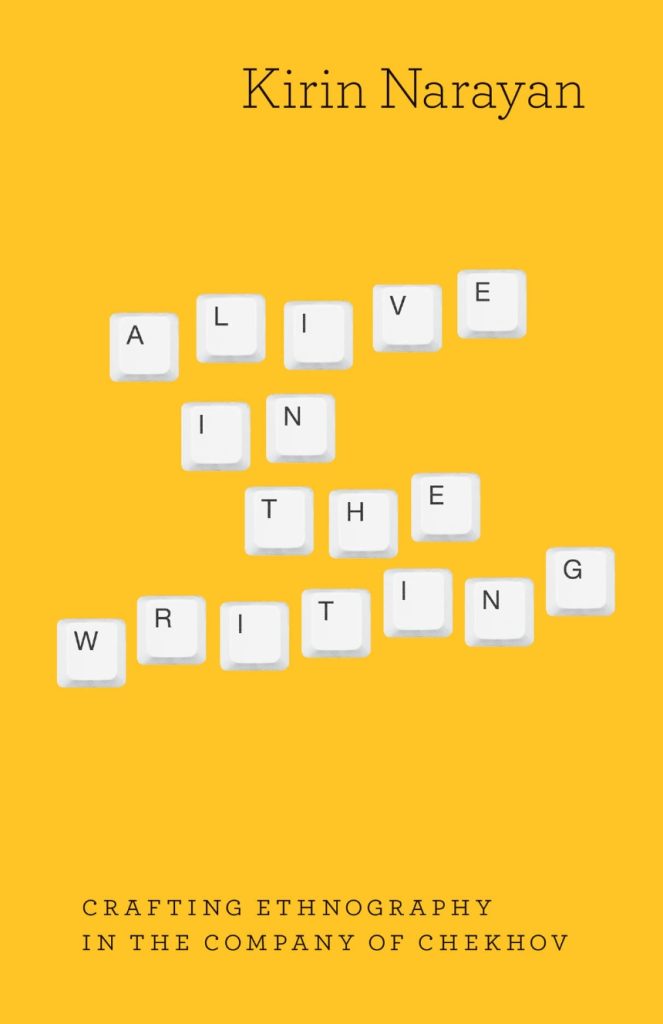
Alive in the Writing: Crafting Ethnography in the Company of Chekhov by Kirin Narayan (University of Chicago Press, 2012) *
Recommended by Christina Chung in Write for You, Season 2, Episode 5
Available from the UW Libraries in both eBook and print formats.
From the publisher:
Anton Chekhov is revered as a boldly innovative playwright and short story writer—but he wrote more than just plays and stories. In Alive in the Writing—an intriguing hybrid of writing guide, biography, and literary analysis—anthropologist and novelist Kirin Narayan introduces readers to some other sides of Chekhov: his pithy, witty observations on the writing process, his life as a writer through accounts by his friends, family, and lovers, and his venture into nonfiction through his book Sakhalin Island. By closely attending to the people who lived under the appalling conditions of the Russian penal colony on Sakhalin, Chekhov showed how empirical details combined with a literary flair can bring readers face to face with distant, different lives, enlarging a sense of human responsibility.
Highlighting this balance of the empirical and the literary, Narayan calls on Chekhov to bring new energy to the writing of ethnography and creative nonfiction alike. Weaving together selections from writing by and about him with examples from other talented ethnographers and memoirists, she offers practical exercises and advice on topics such as story, theory, place, person, voice, and self. A new and lively exploration of ethnography, Alive in the Writing shows how the genre’s attentive, sustained connection with the lives of others can become a powerful tool for any writer.
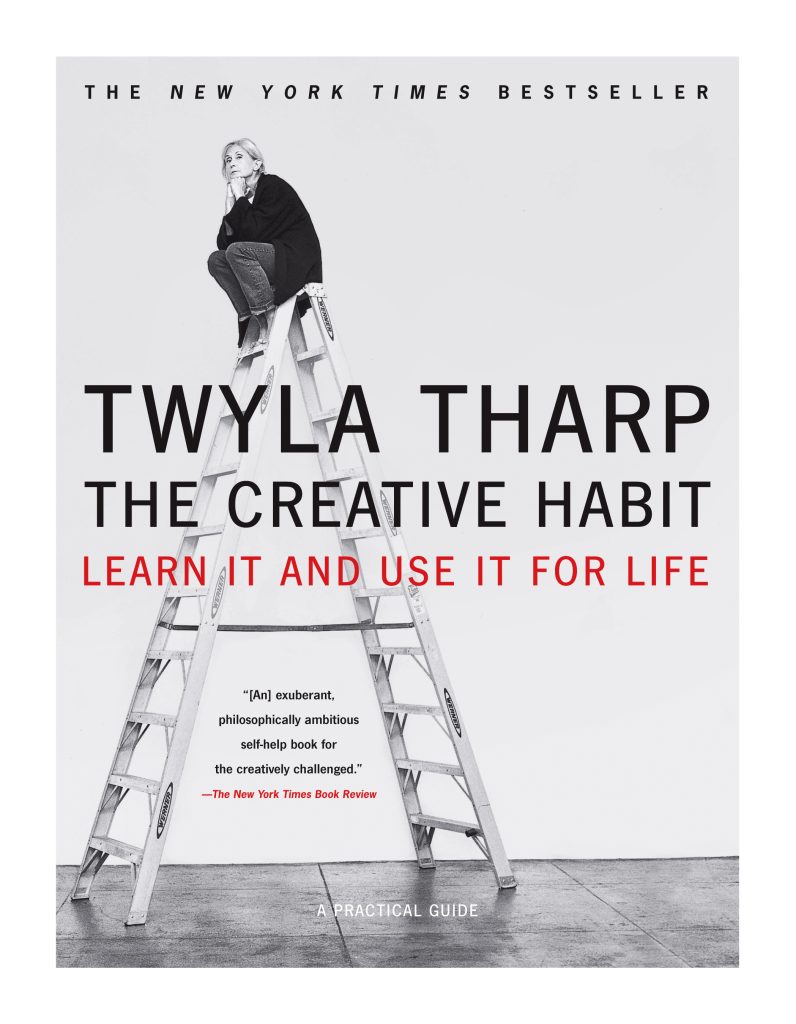
The Creative Habit:Learn It and Use It for Life by Twyla Tharp (Simon & Schuster, 2006) **
Recommend by Safi Karmy-Jones in Write for You, Season 3, Episode 3
Available from the UW Libraries in print.
From the publisher (excerpted):
All it takes to make creativity a part of your life is the willingness to make it a habit. It is the product of preparation and effort, and is within reach of everyone. Whether you are a painter, musician, businessperson, or simply an individual yearning to put your creativity to use, The Creative Habit provides you with thirty-two practical exercises based on the lessons Twyla Tharp has learned in her remarkable thirty-five-year career.
Tharp leads you through the painful first steps of scratching for ideas, finding the spine of your work, and getting out of ruts and into productive grooves. The wide-open realm of possibilities can be energizing, and Twyla Tharp explains how to take a deep breath and begin…
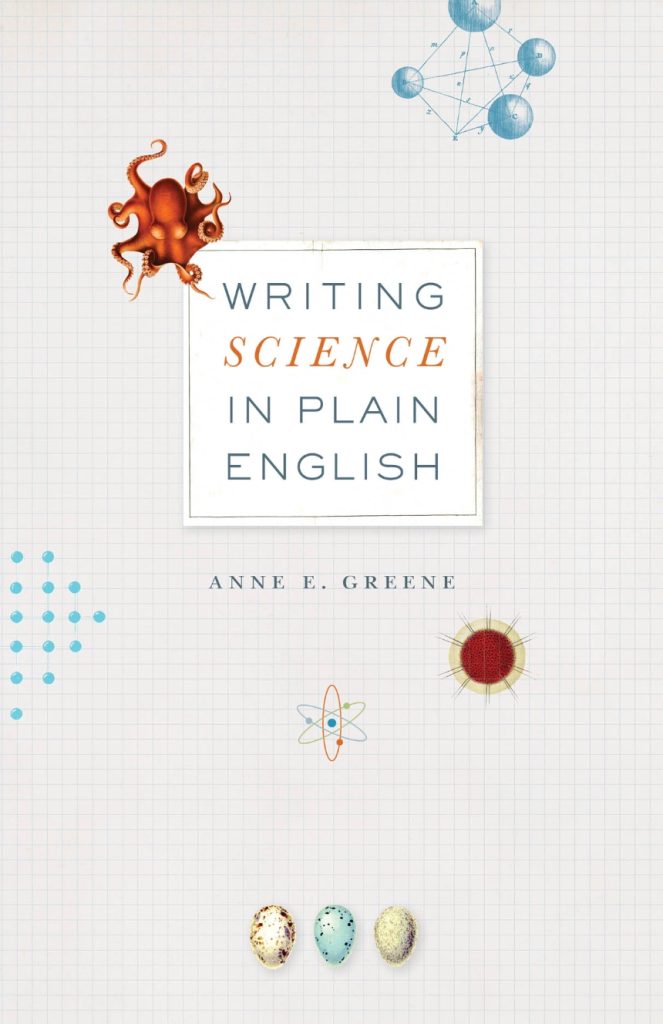
Science Writing in Plain English by Anne Greene (University of Chicago Press, 2013)*
Recommended by a former OWRC tutor and graduate student
Available from the UW Libraries in print.
From the publisher (excerpted):
Scientific writing is often dry, wordy, and difficult to understand. But, as Anne E. Greene shows in Writing Science in Plain English, writers from all scientific disciplines can learn to produce clear, concise prose by mastering just a few simple principles.
This short, focused guide presents a dozen such principles based on what readers need in order to understand complex information, including concrete subjects, strong verbs, consistent terms, and organized paragraphs. The author, a biologist and an experienced teacher of scientific writing, illustrates each principle with real-life examples of both good and bad writing and shows how to revise bad writing to make it clearer and more concise. She ends each chapter with practice exercises so that readers can come away with new writing skills after just one sitting.
Writing Science in Plain English can help writers at all levels of their academic and professional careers—undergraduate students working on research reports, established scientists writing articles and grant proposals, or agency employees working to follow the Plain Writing Act. This essential resource is the perfect companion for all who seek to write science effectively.
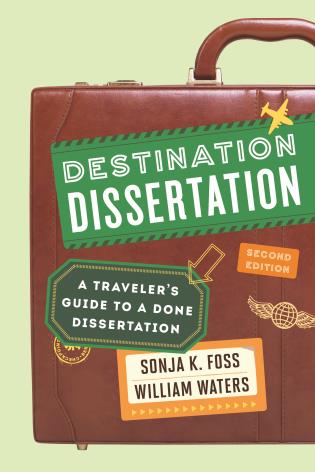
Destination Dissertation: A Traveler’s Guide to a Done Dissertation by Sonja Foss and William Waters (Rowman & Littlefield, 2015) ***
Recommended by a UW PhD graduate and 2021 OWRC Dissertation Writing Intensive (formerly the Dissertation Writing Retreat) discussant.
Available from the UW Libraries in print.
From the publisher:
Your dissertation is not a hurdle to jump or a battle to fight; as this handbook makes clear, your dissertation is the first of many destinations on the path of your professional career. Destination Dissertation guides you to the successful completion of your dissertation by framing the process as a stimulating and exciting trip—one that can be completed in fewer than nine months and by following twenty-nine specific steps. Sonja Foss and William Waters—your guides on this trip—explain concrete and efficient processes for completing the parts of the dissertation that tend to cause the most delays: conceptualizing a topic, developing a pre-proposal, writing a literature review, writing a proposal, collecting and analyzing data, and writing the last chapter. This guidebook is crafted for use by students in all disciplines and for both quantitative and qualitative dissertations, and incorporates a wealth of real-life examples from every step of the journey.
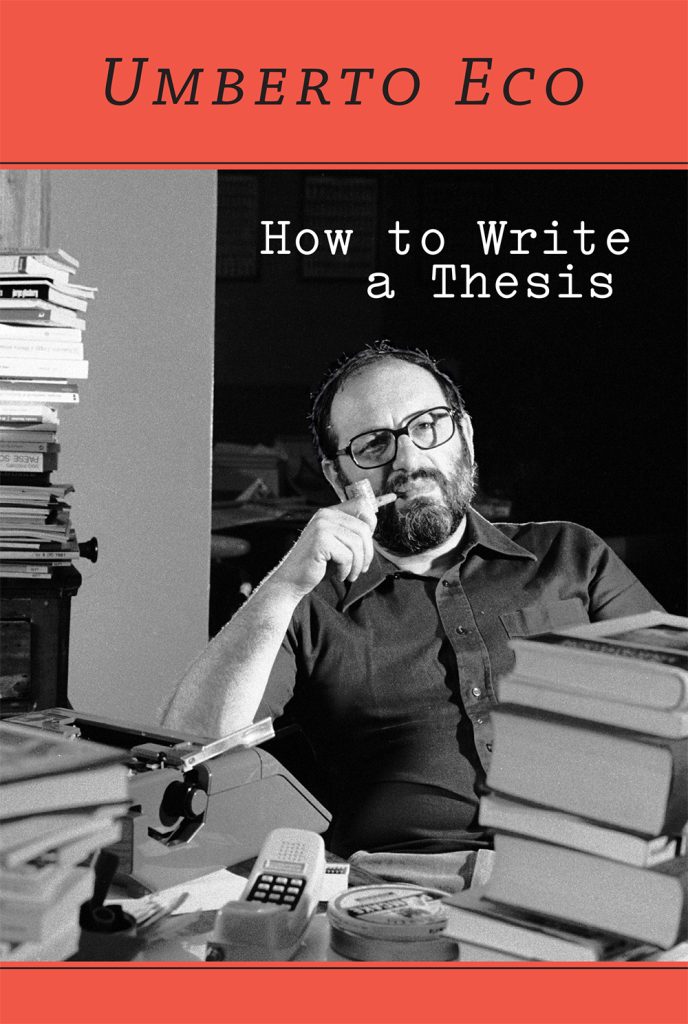
How to Write a Thesis by Umberto Eco (MIT Press, 2015) **
Recommendation taken from Maria C. Taylor in Write for You, Season 3, Episode 3
Available from the UW Libraries in both eBook and print formats.
From the publisher (excerpted):
By the time Umberto Eco published his best-selling novel The Name of the Rose, he was one of Italy’s most celebrated intellectuals, a distinguished academic and the author of influential works on semiotics. Some years before that, in 1977, Eco published a little book for his students, How to Write a Thesis, in which he offered useful advice on all the steps involved in researching and writing a thesis—from choosing a topic to organizing a work schedule to writing the final draft. Now in its twenty-third edition in Italy and translated into seventeen languages, How to Write a Thesis has become a classic. Remarkably, this is its first, long overdue publication in English.
Eco’s approach is anything but dry and academic. He not only offers practical advice but also considers larger questions about the value of the thesis-writing exercise. How to Write a Thesis is unlike any other writing manual. It reads like a novel. It is opinionated. It is frequently irreverent, sometimes polemical, and often hilarious. Eco advises students how to avoid “thesis neurosis” and he answers the important question “Must You Read Books?” He reminds students “You are not Proust” and “Write everything that comes into your head, but only in the first draft.” Of course, there was no Internet in 1977, but Eco’s index card research system offers important lessons about critical thinking and information curating for students of today who may be burdened by Big Data.
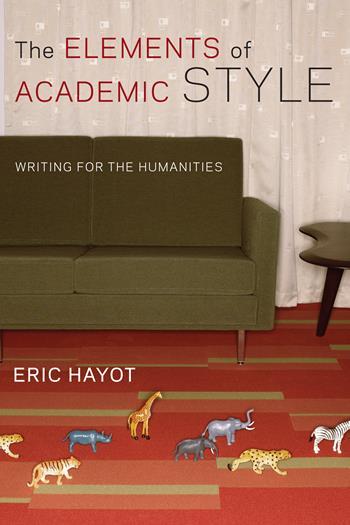
The Elements of Academic Style: Writing for the Humanities by Eric Hayot (Columbia University Press, 2014) **
Recommendation from a Dissertation Writing Intensive panelist.
Available from the UW Libraries in both eBook and print formats.
From the publisher (excerpted):
Eric Hayot teaches graduate students and faculty in literary and cultural studies how to think and write like a professional scholar. From granular concerns, such as sentence structure and grammar, to big-picture issues, such as adhering to genre patterns for successful research and publishing and developing productive and rewarding writing habits, Hayot helps ambitious students, newly minted Ph.D.’s, and established professors shape their work and develop their voices. Hayot does more than explain the techniques of academic writing. He aims to adjust the writer’s perspective, encouraging scholars to think of themselves as makers and doers of important work. Scholarly writing can be frustrating and exhausting, yet also satisfying and crucial, and Hayot weaves these experiences, including his own trials and tribulations, into an ethos for scholars to draw on as they write. Combining psychological support with practical suggestions for composing introductions and conclusions, developing a schedule for writing, using notes and citations, and structuring paragraphs and essays, this guide to the elements of academic style does its part to rejuvenate scholarship and writing in the humanities.
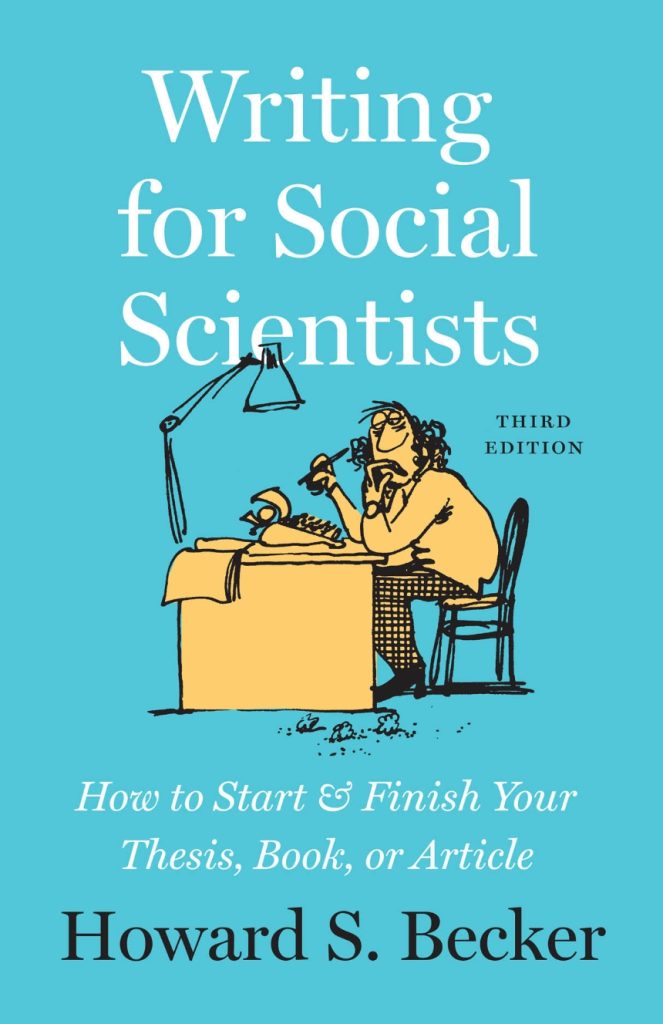
Writing for Social Scientists: How to Start and Finish Your Thesis, Book, or Article by Howard S. Becker (University of Chicago Press, 2007) *
Recommendation from a Dissertation Writing Intensive panelist.
Available from the UW Libraries in both eBook and print formats.
From the publisher (excerpted):
For more than thirty years, Writing for Social Scientists has been a lifeboat for writers in all fields, from beginning students to published authors. It starts with a powerful reassurance: Academic writing is stressful, and even accomplished scholars like sociologist Howard S. Becker struggle with it. And it provides a clear solution: In order to learn how to write, take a deep breath and then begin writing. Revise. Repeat.
This is not a book about sociological writing. Instead, Becker applies his sociologist’s eye to some of the common problems all academic writers face, including trying to get it right the first time, failing, and therefore not writing at all; getting caught up in the trappings of “proper” academic writing; writing to impress rather than communicate with readers; and struggling with the when and how of citations. He then offers concrete advice, based on his own experiences and those of his students and colleagues, for overcoming these obstacles and gaining confidence as a writer.
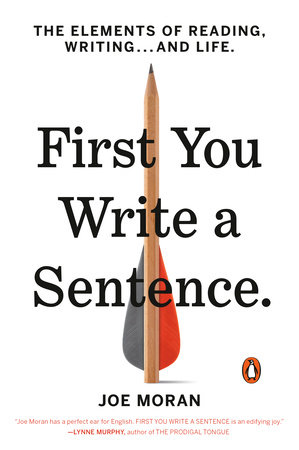
First You Write a Sentence by Joe Moran (Penguin Books, 2019) **
Recommendation from OWRC tutoring staff.
Available from the UW Libraries in both eBook and print formats.
From the publisher:
An exploration of how the most ordinary words can be turned into verbal constellations of extraordinary grace through the art of building sentences.
The sentence is the common ground where every writer walks. A good sentence can be written (and read) by anyone if we simply give it the gift of our time, and it is as close as most of us will get to making something truly beautiful. Using minimal technical terms and sources ranging from the Bible and Shakespeare to George Orwell and Maggie Nelson, as well as scientific studies of what can best fire the reader’s mind, author Joe Moran shows how we can all write in a way that is clear, compelling and alive.
Whether dealing with finding the ideal word, building a sentence, or constructing a paragraph, First You Write a Sentence informs by light example: much richer than a style guide, it can be read not only for instruction but for pleasure and delight. And along the way, it shows how good writing can help us notice the world, make ourselves known to others, and live more meaningful lives. It’s an elegant gem in praise of the English sentence.